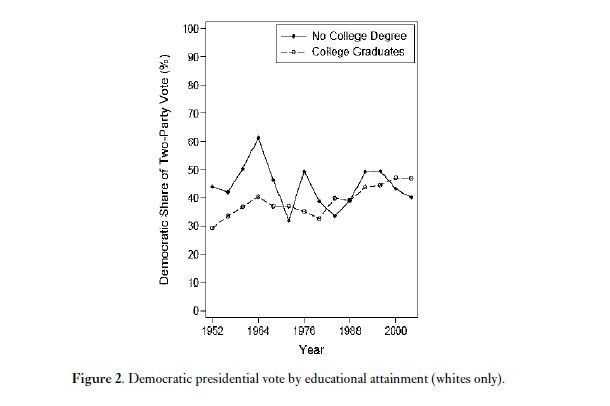
George Packer has a wonderful little essay on the immiseration, and growing Republican leanings, of the white working class. But before proceeding with any discussion of his analysis, we have to address political scientist John Sides, who interrupts to insist, “The white working class has not, as a whole, become more Republican.”
Sides presents this chart, from Larry Bartels, which he says shows “only the merest hint of a secular trend in the voting behavior of whites without college degrees”:

I’m a fan of both Sides and Bartels, but I don’t think this chart really shows what they say it does. The first problem, as Ruy Teixeira and Alan Abramowitz have noted, is that it begins during the Eisenhower era, when white working-class support for the Democrats was unusually low owing to Ike’s spectacular popularity:
Democrats averaged 55 percent support in the five New Deal elections from 1932 to 1948 and then an identical 55 percent in the 1960-64 elections which closed the era. That compares with an average of only 43 percent in the 1952-56 elections. Thus, starting with the Eisenhower elections sets up one’s analysis (if the focus is the presidential vote) to see relatively little decline in Democratic support among working class whites.
It’s always hard to pinpoint a specific demographic trend when the electorate as a whole bounces up and down. Democrats are doing a lot worse with the white working class than they were in 1964, when the party won a huge blowout national election, but also better than they fared in 1972, when they lost a blowout election. But a trend is clearly discernible if you match up comparable elections. 1976 and 2000 were similar elections in that the Democrats eked out tiny popular-vote margins, but in the former they split the white working-class vote, and in the latter, they lost it by double digits. Bill Clinton split the white working-class vote in both his victories, while Barack Obama’s win came while losing that group by nearly twenty points.
I think it’s pretty clear that white voters without a college degree have been trending Republican.
Anyway, Packer’s take on white working-class decline is very solid. The touchstone for his piece is Charles Murray’s new book, Coming Apart, which has sparked an interesting and productive debate. The book, which argues that the white working class is falling behind because its social values have collapsed, made its first big splash on the national scene in a fawning column by David Brooks. David Frum proceeded to methodically shred Murray’s thesis. Ross Douthat, having conceded that Frum has pretty much destroyed Murray’s argument, nonetheless says that Murray’s description itself is useful:
“Coming Apart” offers a convincing account of how meritocracy has exacerbated the problems that Murray describes — encouraging the best and brightest to work and live and (especially) mate within the cocoons of what he calls the SuperZIPS, segregating Americans by intelligence to an unprecedented degree, and creating a self-reinforcing pattern in to those with much social capital, much more is given, while to those without, even what they have is taken away.
Packer more or less takes the same line:
Murray has a talent for raising important questions on the way to arriving at invidious answers … Visit most towns or rural areas where factories are boarded up and all the economic life is confined to strip malls, and you have to acknowledge the force of Murray’s picture. Rampant drug use, high dropout rates, out-of-wedlock births, epidemic obesity, every other working-age person on disability — it’s true even though Charles Murray says it’s true.
What seems incontrovertible is that Murray’s proposed solution of eliminating government programs and encouraging rich people to lecture the working class more does not offer any remotely plausible solution. Douthat suggests that traditional values offer part of the solution, but that doesn’t offer a whole lot in terms of conservative public policy solutions. The last two Democratic presidents have proposed or enacted a series of small changes designed to promote work among the working class — expanded Earned Income Tax Credit, more money for community college and job training. That’s not a “values”-based solution, but there’s not much else government can do to get people to work hard and stay married.






























